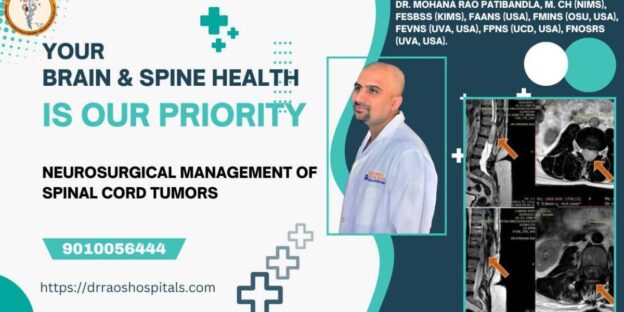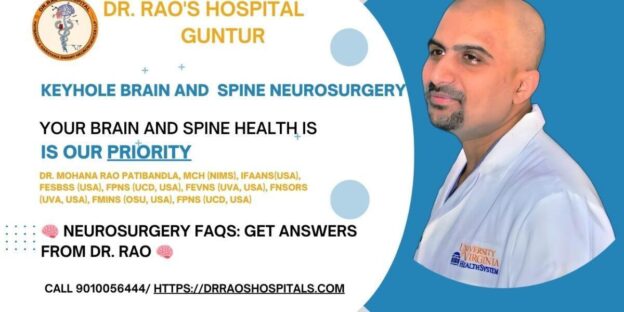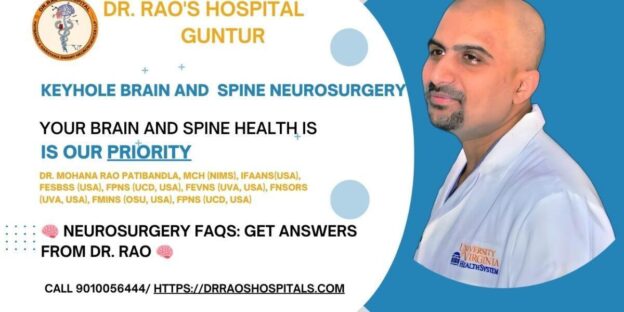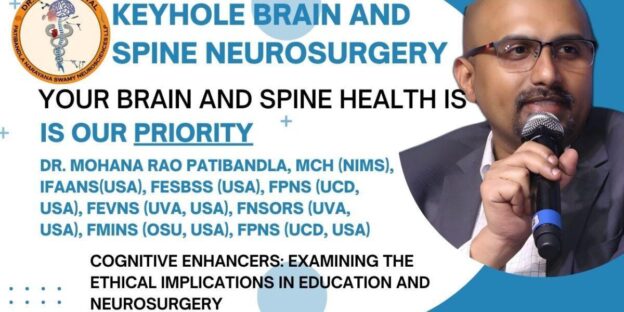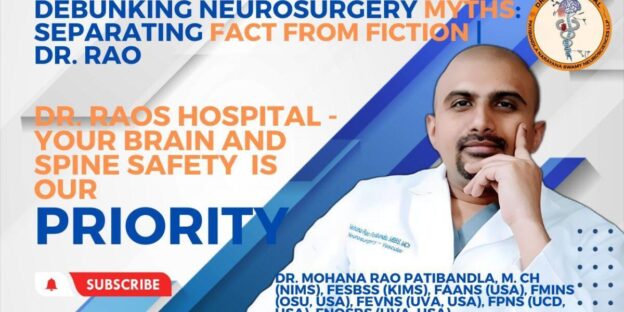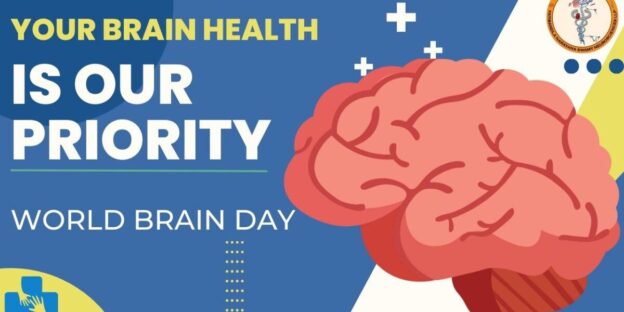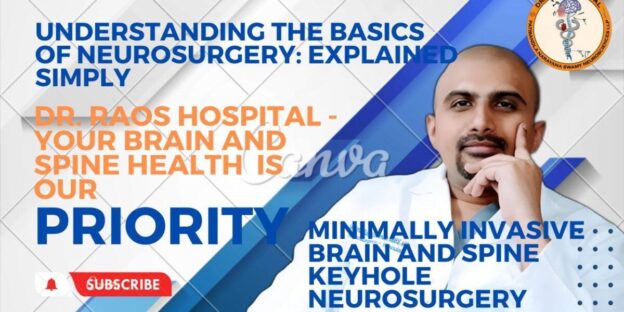Neurosurgical Care for Spinal Cord Tumors – Restoring Mobility
Discover how Dr. Rao, the best neurosurgeon in Guntur and India, and Dr. Rao’s Hospital provide state-of-the-art neurosurgical interventions for spinal cord tumors, restoring mobility and enhancing the quality of life.
Introduction
Spinal cord tumors are a complex and challenging condition that affects the delicate spinal cord, leading to significant neurological deficits and impairments. These tumors can originate within the spinal cord or develop from nearby structures and compress the spinal cord, causing various symptoms. Fortunately, advancements in neurosurgical techniques have revolutionized the management of spinal cord tumors, offering hope for patients in restoring mobility and function. In Guntur and throughout India, Dr. Rao, the best neurosurgeon, and Dr. Rao’s Hospital, the premier neurosurgery hospital, are at the forefront of providing comprehensive care for spinal cord tumors. In this blog, we will explore the neurosurgical approaches employed by Dr. Rao and his team to effectively manage spinal cord tumors, restore mobility, and improve the quality of life for patients.
Understanding Spinal Cord Tumors
Spinal cord tumors are abnormal growths that can be benign (non-cancerous) or malignant (cancerous). These tumors can arise from various structures within the spinal cord, such as the nerve cells, supporting tissues, or the coverings of the spinal cord. Additionally, tumors from other body parts can metastasize and spread to the spinal cord, causing secondary tumors.
Symptoms of spinal cord tumors can vary depending on the location, size, and type of tumor. Common signs include back pain, weakness or numbness in the limbs, difficulty walking, loss of coordination, and bladder or bowel dysfunction. Early diagnosis and prompt treatment are essential for better outcomes.
Neurosurgical Approaches for Spinal Cord Tumors:
Comprehensive Evaluation and Imaging:
Dr. Rao’s expertise lies in thoroughly evaluating spinal cord tumors. This involves a detailed medical history review, comprehensive physical examination, and advanced imaging techniques such as magnetic resonance imaging (MRI) and computed tomography (CT) scans. These imaging modalities provide precise information about the tumor’s location, size, and characteristics, enabling Dr. Rao to plan the most appropriate treatment strategy.
Surgical Resection
Surgical resection, also known as tumor removal, is a critical component of the neurosurgical management of spinal cord tumors. With his exceptional surgical skills and expertise, Dr. Rao specializes in performing precise and safe tumor resections while preserving the integrity of the surrounding healthy tissues.

The surgical resection involves an incision in the affected spine to access the tumor. Dr. Rao utilizes advanced imaging techniques, such as intraoperative navigation systems and neurophysiological monitoring, to precisely locate the tumor and guide the surgical process. These technologies enable him to navigate the delicate structures of the spinal cord and nerve roots with utmost precision.
During the surgery, Dr. Rao carefully removes the tumor, aiming for maximal resection while minimizing the risk of damage to the spinal cord and adjacent neural structures. The extent of tumor removal depends on various factors, including the tumor size, location, and involvement with surrounding tissues. Complete tumor removal is sometimes achievable, significantly improving neurological function and symptom relief.
Dr. Rao and his team take a multidisciplinary approach to ensure the safety and success of the surgical resection. They collaborate closely with other specialists, such as neurologists, radiologists, and oncologists, to develop a comprehensive treatment plan tailored to each patient’s needs. This collaborative effort ensures that the surgery is performed optimally, considering the patient’s overall health, tumor characteristics, and desired outcomes.
Following the surgical resection, the patient is closely monitored and provided with post-operative care to promote healing and recovery. Rehabilitation and physical therapy may be recommended to aid in the restoration of mobility and function. Dr. Rao and his team are committed to providing comprehensive support and guidance throughout the treatment process, helping patients regain their independence and improve their quality of life.
It’s important to note that while surgical resection is a highly effective treatment option for spinal cord tumors, the decision to undergo surgery is based on carefully evaluating each patient’s case. Dr. Rao thoroughly assesses the tumor’s characteristics, the patient’s overall health, and any associated risks to determine the most appropriate course of action.
In summary, surgical resection plays a vital role in the neurosurgical management of spinal cord tumors. Dr. Rao’s expertise, combined with the advanced resources and technology available at Dr. Rao’s Hospital, ensures that patients receive the highest standard of care. By performing precise and safe tumor resections, Dr. Rao aims to alleviate symptoms, improve neurological function, and enhance the overall quality of life for individuals with spinal cord tumors.
Intraoperative Neurophysiological Monitoring
Intraoperative neurophysiological monitoring is crucial to Dr. Rao’s surgical approach to spinal cord tumors. This advanced technique allows for real-time monitoring of the electrical activity of the spinal cord and nerves during the surgery. By closely monitoring these signals, any potential changes or damage to the nervous system can be promptly detected and addressed, ensuring the safety and accuracy of the procedure.

During the surgery, specialized monitoring equipment records and analyzes the electrical signals generated by the spinal cord and nerves. This is achieved by strategically placing electrodes along the neural pathways at risk of injury during the surgical intervention. The electrodes capture and transmit the electrical activity to a monitoring system, where a trained neurophysiologist analyzes the signals in real-time.
The neurophysiologist closely monitors the signals and provides immediate feedback to Dr. Rao throughout the procedure. This feedback helps guide Dr. Rao’s surgical techniques and allows him to make informed decisions to minimize the risk of damage to the spinal cord and nerves. Dr. Rao can modify his approach to mitigate potential harm and preserve neurological function if any signal changes are detected, such as decreased nerve activity or abnormal responses.
Intraoperative neurophysiological monitoring enhances patient safety during spinal cord tumor surgeries. By continuously monitoring the electrical activity, any potential issues can be identified and addressed in real time, reducing the risk of postoperative complications and optimizing patient outcomes.
The benefits of intraoperative neurophysiological monitoring extend beyond immediate surgical safety. The information gathered during the procedure provides valuable insights into the spinal cord’s and nerves’ functional integrity. It helps assess the nervous system’s overall health, guides postoperative care, and facilitates the development of personalized rehabilitation plans for each patient.
Dr. Rao and his highly skilled team are experienced in utilizing intraoperative neurophysiological monitoring techniques to maximize patient safety and optimize surgical outcomes. Combining their expertise with state-of-the-art monitoring technology ensures the highest precision and accuracy in addressing spinal cord tumors while safeguarding delicate neural structures.
Intraoperative neurophysiological monitoring is essential to Dr. Rao’s neurosurgical approach to spinal cord tumors. This technique allows for real-time monitoring of the electrical activity of the spinal cord and nerves, enabling the detection and prompt management of any potential changes or damage. By incorporating this advanced technology into surgical procedures, Dr. Rao and his team prioritize patient safety, preserve neurological function, and achieve optimal outcomes.
Spinal Stabilization and Reconstruction:
Spinal stabilization and reconstruction techniques are crucial in comprehensively managing spinal cord tumors. In cases where tumor resection leads to spinal instability or deformity, Dr. Rao employs these innovative procedures to restore spinal stability, promote healing, and optimize long-term patient outcomes.

After a spinal cord tumor is removed, structural integrity and stability in the affected spine area may be lost. This can result in spinal instability, leading to pain, deformity, and functional limitations. Dr. Rao utilizes spinal stabilization and reconstruction techniques to address these challenges to support and stabilize the spine.
The process begins with a thorough evaluation of the patient’s condition, including a comprehensive assessment of the spinal alignment, degree of instability, and potential risks associated with the surgery. Based on these findings, Dr. Rao develops a personalized treatment plan tailored to each patient’s needs.
Spinal stabilization and reconstruction procedures involve using implants such as screws, rods, or cages, which are carefully placed in the spine to provide stability and support. These implants act as internal fixation devices, securing the spinal segments and promoting proper alignment. The choice of implants and surgical techniques depends on various factors, including the location and extent of the spinal instability, the overall spinal health, and the individual patient’s needs.
Dr. Rao positions the implants precisely using advanced imaging guidance and surgical instrumentation during the surgery. This ensures accurate placement and optimal alignment of the spinal segments. The implants create a solid framework that promotes the fusion of vertebral bones over time, enhancing stability and preventing future deformities.
By restoring spinal stability, these interventions alleviate pain and discomfort and provide a solid foundation for the healing process. They allow for better load distribution across the spine, reducing the risk of adjacent segment degeneration and minimizing the chances of complications in the long term.
Dr. Rao’s expertise in spinal stabilization and reconstruction techniques and his meticulous surgical skills ensure the highest precision and effectiveness in restoring spinal stability. His approach is guided by a commitment to personalized care and a focus on achieving optimal outcomes for each patient.
In conclusion, spinal stabilization and reconstruction techniques are essential components of the neurosurgical management of spinal cord tumors. These procedures, performed by Dr. Rao, the best neurosurgeon in Guntur and India, help restore spinal stability, prevent deformities, and promote long-term healing. By utilizing advanced implants and surgical techniques, Dr. Rao ensures that patients receive comprehensive care that addresses the tumor and any resultant spinal instability, leading to improved quality of life and long-term functional outcomes.
Adjuvant Therapies
Adjuvant therapies are crucial in the comprehensive management of spinal cord tumors. In addition to surgical interventions, Dr. Rao may recommend adjuvant therapies such as radiation therapy or chemotherapy to enhance treatment outcomes and improve long-term prognosis. These therapies are tailored to the specific characteristics of the tumor and aim to target any remaining tumor cells that may not have been completely removed during surgery.
Radiation therapy, or radiotherapy, utilizes high-energy radiation beams to destroy cancer cells and shrink tumors. It is often used after surgical resection to target any residual tumor cells that may be present in the surrounding tissues. Dr. Rao works closely with radiation oncologists to develop an individualized radiation treatment plan for each patient. The radiation beams are precisely directed to the affected spinal cord area, maximizing the therapeutic effect while minimizing damage to healthy tissues. This targeted approach helps to reduce the risk of tumor recurrence and improve overall treatment outcomes.
Chemotherapy, on the other hand, involves the use of medications or drugs to destroy cancer cells throughout the body. It may be recommended in cases where the tumor is sensitive to chemotherapy drugs or if there is a risk of cancer cells spreading to other parts of the body. The specific chemotherapy drugs and treatment regimen will depend on the type and characteristics of the tumor. Dr. Rao collaborates with medical oncologists to determine the most appropriate chemotherapy protocol for each patient, considering factors such as the tumor’s response to specific drugs, potential side effects, and overall health.
The decision to include adjuvant therapies in the treatment plan is based on a comprehensive evaluation of the individual patient’s condition, tumor characteristics, and the likelihood of achieving optimal outcomes. Dr. Rao and his multidisciplinary team carefully assess adjuvant therapies’ potential benefits and risks to ensure they are tailored to each patient’s needs.
Adjuvant therapies can provide several advantages in the management of spinal cord tumors. They help target any remaining tumor cells that may not have been removed surgically, reducing the risk of recurrence or progression of the tumor. By combining surgical interventions with adjuvant therapies, Dr. Rao aims to maximize the treatment’s effectiveness and improve the patient’s long-term prognosis.
In conclusion, adjuvant therapies such as radiation therapy and chemotherapy are critical in the comprehensive management of spinal cord tumors. Dr. Rao, the best neurosurgeon in Guntur and India, carefully considers the type and characteristics of the tumor, as well as the individual patient’s condition, to determine the most appropriate adjuvant therapies. By combining surgical interventions with these targeted treatments, Dr. Rao ensures a comprehensive and personalized approach that optimizes outcomes and enhances the overall prognosis for patients.
Conclusion
Neurosurgical management of spinal cord tumors is a complex and multi-faceted process that requires the expertise of a skilled neurosurgeon like Dr. Rao and the comprehensive facilities provided by Dr. Rao’s Hospital in Guntur. Dr. Rao and his team are dedicated to restoring mobility and function for spinal cord tumors through advanced diagnostic tools, precise surgical techniques, and a multidisciplinary approach.
The combination of Dr. Rao’s extensive experience, technical proficiency, and compassionate patient care ensures the best possible outcomes for individuals facing the challenges of spinal cord tumors. By employing the latest advancements in neurosurgery, Dr. Rao can tailor treatment plans to each patient’s specific needs, considering factors such as tumor type, location, and overall health.
It’s important to note that the success of neurosurgical interventions for spinal cord tumors depends on early detection and timely intervention. Therefore, seeking immediate medical attention is crucial if you or a loved one experience any symptoms suggestive of a spinal cord tumor, such as persistent back pain or neurological deficits.
At Dr. Rao’s Hospital, managing spinal cord tumors begins with a comprehensive evaluation, followed by meticulous planning and execution of the most appropriate surgical approach. Patient comfort, safety, and well-being are the top priorities throughout the process.
In conclusion, the field of neurosurgery has witnessed significant advancements in the management of spinal cord tumors. With Dr. Rao’s expertise and the cutting-edge resources available at Dr. Rao’s Hospital, patients can expect comprehensive care that focuses on restoring mobility, improving function, and enhancing their quality of life. By choosing Dr. Rao and his team, individuals with spinal cord tumors can have confidence in their ability to overcome the challenges posed by their condition and regain control of their lives.
Hashtags: #SpinalCordTumors #Neurosurgery #RestoringMobility #DrRao #DrRaosHospital #Guntur #India

